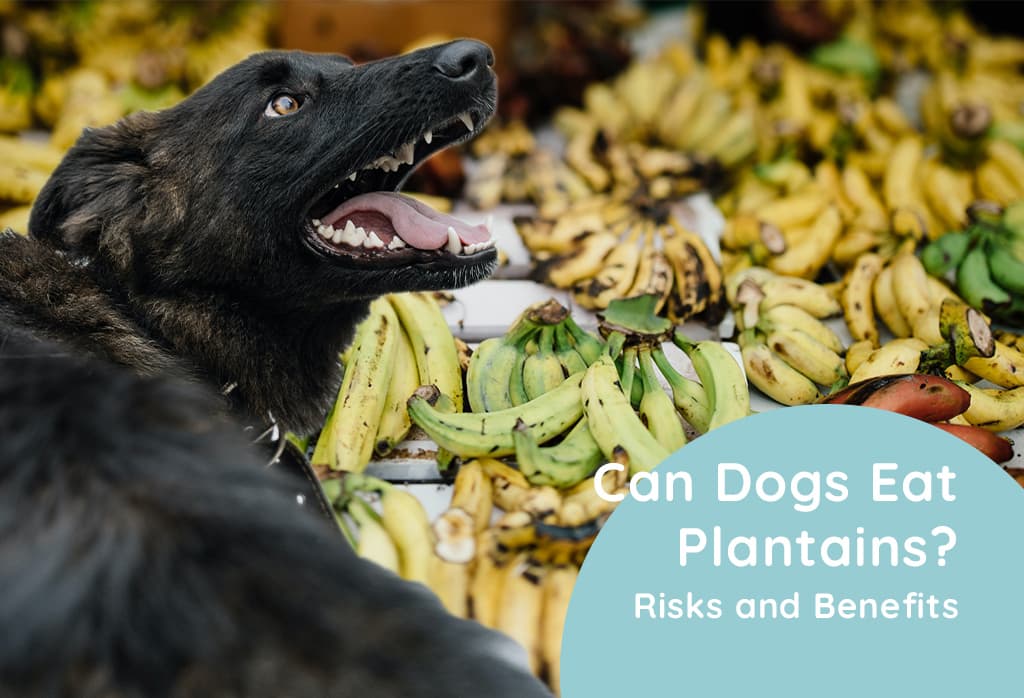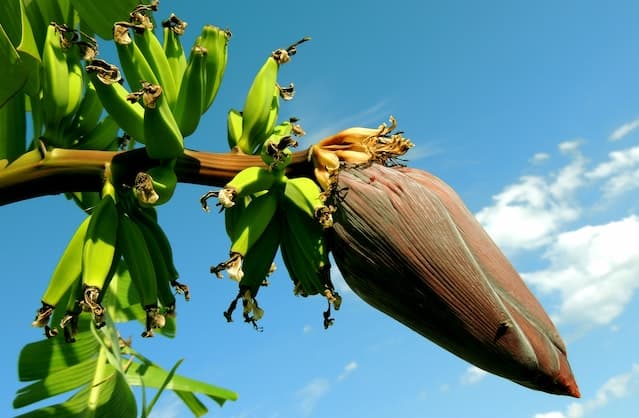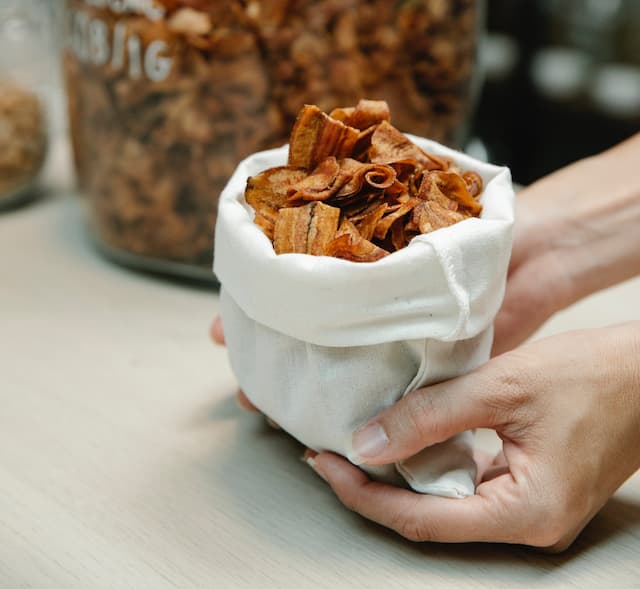We all know that our furry friends love to eat just about anything they can get their paws on, but it’s important to ensure they’re eating safe and healthy foods.
One food that many of us may need clarification on is plantains.
So, let’s dive in and find out if our pups can enjoy this tasty treat!
What Are Plantains?
Plantains are a type of tropical fruit that is closely related to bananas.
They have thicker skin and are usually larger than bananas.
Plantains are typically cooked before eating, as they are quite starchy and can be pretty hard when raw.
They are popular in many dishes, including Latin American and Caribbean cuisines.
Plantains can be fried, baked, or boiled and are often paired with savory flavors such as garlic, onion, and cilantro.
Can Dogs Eat Plantains?
Dogs can technically eat plantains, but it’s important to remember that they should be fed in moderation and as an occasional treat.
Plantains are a good source of vitamins and minerals, such as potassium, vitamin A, vitamin C, vitamin B6, magnesium, fiber, and iron.
However, checking with your vet before introducing any new foods to your dog’s diet is important.
Excessive intake of some of these vitamins and minerals can harm dogs and lead to health problems.
Additionally, plantains should be cooked and never be fed raw, as raw plantains contain high levels of resistant starch, which can cause digestive problems in dogs.
So, it’s always best to consult your veterinarian to include plantains in your dog’s diet.
Remember, a balanced and complete diet, including various fruits, vegetables, and protein sources, is crucial for maintaining a healthy and happy dog.
Understanding the Vitamins and Minerals in Plantains and Their Impact on Dogs’ Health
Plantains are a good source of vitamins and minerals such as potassium, vitamins A, C, and B6, magnesium, Fiber, and Iron.
Let’s take a closer look at the vitamins and minerals found in plantains and discuss their potential impact on dogs’ health.
Potassium
Potassium is an essential mineral needed for various bodily functions in dogs, just like it does for humans.
It helps to regulate the balance of fluids in the body and is vital for maintaining healthy blood pressure and heart function.
Regarding dogs, potassium is needed for the proper functioning of muscle and nerve cells.
It also helps to regulate the balance of fluids in the body and is important for maintaining healthy blood pressure and heart function.
A diet low in potassium can lead to muscle weakness, fatigue, and an irregular heartbeat.
It’s important to note that while Plantains contain potassium, dogs do not have the same dietary needs as humans, and Plantains should not be fed to them as a main source of potassium, especially if they are on a specific diet.
It’s always best to check with your vet before introducing new foods to your dog’s diet.
In short, potassium is an essential mineral necessary for maintaining healthy muscle and nerve function, blood pressure, and heart function in dogs.
Plantains contain potassium, but they should be fed in moderation and as an occasional treat rather than a primary mineral source.
As always, checking with your vet before introducing any new foods to your dog’s diet is best.
Vitamin A
Vitamin A is an important nutrient for dogs, just like humans.
It helps to maintain healthy vision, skin, and immune function.
Vitamin A is found in two forms: preformed Vitamin A (retinoids) and provitamin A carotenoids.
Plantains contain beta-carotene, a provitamin A carotenoid, and can be converted to Vitamin A in the body.
Vitamin A plays a critical role in maintaining good vision, especially in low-light conditions.
It also helps maintain healthy skin and coat, and the immune system needs to function correctly.
A diet low in Vitamin A can lead to dry and dull coat, poor vision, and increased susceptibility to infection.
Plantains should be fed in moderation as an occasional treat rather than a main source of Vitamin A.
It’s always best to check with your vet before introducing new foods to your dog’s diet.
Vitamin C
Vitamin C is an essential nutrient that is important for the overall health of dogs, just like it is for humans.
It plays a vital role in the production of collagen, a protein that helps keep the skin, bones, and blood vessels healthy.
Vitamin C is also an antioxidant, which helps protect the body from damage caused by harmful molecules called free radicals.
Vitamin C is also important for the immune system function.
It helps to fight off harmful bacteria and viruses.
A diet low in Vitamin C can lead to a weaker immune system, poor wound healing, and a higher risk of infection.
It’s important to note that while Plantains contain Vitamin C, dogs can produce their own Vitamin C, unlike humans, and therefore do not require to intake it from food.
Therefore, it’s not necessary to feed them plantains as a main source of Vitamin C, and it’s always best to check with your vet before introducing any new foods to your dog’s diet.
Vitamin B6
Vitamin B6, also known as pyridoxine, is an essential nutrient that plays a vital role in various bodily functions in dogs, just like in humans.
It helps in the formation of red blood cells, the metabolism of protein, and the creation of neurotransmitters, which are chemicals that help to transmit messages in the brain.
Vitamin B6 also helps absorb other vitamins and minerals, such as zinc and magnesium.
A deficiency of Vitamin B6 can lead to anemia, skin problems, and neurological issues.
Plantains do contain Vitamin B6, but it’s not a significant source for dogs since a small amount of this vitamin is enough for their daily needs.
Therefore, it’s not necessary to feed them plantains as a main source of Vitamin B6, and it’s always best to check with your vet before introducing any new foods to your dog’s diet.
Magnesium
Magnesium is an essential mineral that plays a vital role in various bodily functions in dogs, just like humans.
It helps form strong bones and teeth, muscle function, and regulation of the heart’s rhythm.
Magnesium also helps in the metabolism of carbohydrates, protein, and fats, as well as in energy production.
A magnesium deficiency can lead to muscle weakness, seizures, and heart problems.
However, it’s important to note that plantains are not a significant source of magnesium for dogs.
Therefore, it’s not necessary to feed them plantains as a main source of magnesium, and it’s always best to check with your vet before introducing any new foods to your dog’s diet.
Fiber
Fiber is an essential component of a dog’s diet.
It helps to regulate their digestion and maintain a healthy gut.
Fiber is the indigestible part of plant-based foods.
It helps to bulk up the stools, making them easier to pass and prevent constipation.
Fiber also helps slow down sugar absorption and can help dogs maintain a healthy weight.
Plantains are a good source of fiber.
However, it’s important to note that dogs have different digestive systems than humans, which allows them to digest meat more efficiently.
Therefore plantains should not be the main source of fiber in their diet.
It’s always best to check with your vet before introducing any new foods to your dog’s diet and to ensure that they are getting the right amount of fiber they need.
Iron
Iron is an essential mineral that plays a vital role in a dog’s overall health and well-being.
It helps form hemoglobin, a protein in red blood cells that carries oxygen throughout the body.
Iron also helps the immune system function properly and aids in the growth and repair of body tissues.
Plantains do contain iron.
However, it’s important to note that the iron in plantains is not as easily absorbed as in animal-based foods.
Therefore, plantains should not be the primary source of iron in a dog’s diet.
Dogs with iron deficiencies may require supplements, and it’s always best to check with your vet before introducing any new foods to your dog’s diet.
Can Dogs Eat Plantain Chips?
While dogs can technically eat plantain chips, it’s important to remember that they should be fed in moderation and as an occasional treat.
Plantain chips are typically deep-fried, which can make them high in fat and calories, and may not be the best choice for dogs.
Also, many plantain chips contain added salt and other seasonings unsuitable for dogs and can cause stomach upset, diarrhea, and other health problems.
It’s always best to check with your vet before introducing new foods to your dog’s diet.
It’s important to remember that a balanced and complete diet, including various fruits, vegetables, and protein sources, is crucial for maintaining a healthy and happy dog.
If you still want to give your dog plantain chips, it’s best to make them at home by baking them and not adding any seasoning, salt, or oil.
In summary, while dogs can technically eat plantain chips, it’s best to give them in moderation and as an occasional treat.
It’s always best to consult with your vet before introducing any new foods to your dog’s diet and ensure the snacks you give your furry friend are healthy and safe.
Health Benefits of Plantains for Dogs
Rich in potassium: Potassium is an essential mineral that helps maintain healthy heart function and muscle strength in dogs.
Good source of Vitamin A: Vitamin A is essential for maintaining healthy eyesight and a healthy immune system in dogs.
Contains Vitamin C: Vitamin C is an important antioxidant that helps protect dogs from cellular damage and promotes healthy skin and coat.
Rich in Vitamin B6: Vitamin B6 is essential for maintaining healthy brain function and a healthy nervous system in dogs.
Contains Magnesium: Magnesium is essential for maintaining healthy bones and teeth in dogs.
Rich in Fiber: Fiber helps promote healthy digestion and prevent constipation in dogs.
Good source of Iron: Iron is essential for maintaining healthy red blood cells and helping to prevent anemia in dogs.
Low in calories: Plantains are low in calories, which can benefit overweight dogs who need to lose weight.
May help prevent cancer: Some studies have shown that plantain antioxidants may help prevent cancer in dogs.
Enhancing digestion: Plantains are rich in fibers, which can help regulate bowel movements and maintain a healthy digestive system.
Risk of Feeding Plantains to Dogs
While plantains can be beneficial for dogs when fed in moderation and as an occasional treat, there are also some potential risks to be aware of.
Some of the risks associated with feeding plantains to dogs include:
Digestive problems: Plantains are high in fiber, which can cause digestive upset if fed in large quantities.
This may lead to symptoms such as diarrhea, vomiting, and bloating.
Allergic reactions: Some dogs may be allergic to plantains, which can cause symptoms such as hives, itching, and swelling.
Weight gain: Plantains are high in carbohydrates, which can contribute to weight gain if fed in large quantities.
Interference with medication: Plantains contain potassium, which can interfere with certain medications such as ACE inhibitors, potassium-sparing diuretics, and potassium supplements.
Interference with a balanced diet: Feeding plantains to your dog too often may lead to a lack of other essential nutrients and minerals that your dog needs in a balanced diet.
It is always best to consult your vet before introducing any new food to your dog’s diet, including plantains.
This way, your vet can advise you on how much and how often to feed your dog plantains and can help you to identify any potential risks or concerns.
Conclusion
In conclusion, plantains contain various vitamins and minerals that can benefit a dog’s health, such as potassium, vitamin A, vitamin C, vitamin B6, magnesium, fiber, and iron.
However, it’s important to remember that plantains should be fed in moderation and as an occasional treat rather than a main source of these nutrients.
Excessive intake of some of these vitamins and minerals can harm dogs and lead to health problems, so it’s always best to check with your vet before introducing any new foods to your dog’s diet.
It’s also important to remember that a balanced and complete diet, including various fruits, vegetables, and protein sources, is crucial for maintaining a healthy and happy dog.














